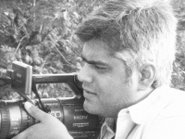Martin Scorsese wrote a letter to his daughter... "and you have to protect the spark of connection that drove you to make the picture in the first place. You have to protect it with your life." For those who want to make films ..
Dearest Francesca,
I’m writing this letter to you about the future. I’m looking at it through the lens of my world. Through the lens of cinema, which has been at the center of that world.
For the last few years, I’ve realized that the idea of cinema that I grew up with, that’s there in the movies I’ve been showing you since you were a child, and that was thriving when I started making pictures, is coming to a close. I’m not referring to the films that have already been made. I’m referring to the ones that are to come.
I don’t mean to be despairing. I’m not writing these words in a spirit of defeat. On the contrary, I think the future is bright.
We always knew that the movies were a business, and that the art of cinema was made possible because it aligned with business conditions. None of us who started in the 60s and 70s had any illusions on that front. We knew that we would have to work hard to protect what we loved. We also knew that we might have to go through some rough periods. And I suppose we realized, on some level, that we might face a time when every inconvenient or unpredictable element in the moviemaking process would be minimized, maybe even eliminated. The most unpredictable element of all? Cinema. And the people who make it.
I don’t want to repeat what has been said and written by so many others before me, about all the changes in the business, and I’m heartened by the exceptions to the overall trend in moviemaking – Wes Anderson, Richard Linklater, David Fincher, Alexander Payne, the Coen Brothers, James Gray and Paul Thomas Anderson are all managing to get pictures made, and Paul not only got The Master made in 70mm, he even got it shown that way in a few cities. Anyone who cares about cinema should be thankful.
And I’m also moved by the artists who are continuing to get their pictures made all over the world, in France, in South Korea, in England, in Japan, in Africa. It’s getting harder all the time, but they’re getting the films done.
But I don’t think I’m being pessimistic when I say that the art of cinema and the movie business are now at a crossroads. Audio-visual entertainment and what we know as cinema – moving pictures conceived by individuals – appear to be headed in different directions. In the future, you’ll probably see less and less of what we recognize as cinema on multiplex screens and more and more of it in smaller theaters, online, and, I suppose, in spaces and circumstances that I can’t predict.
So why is the future so bright? Because for the very first time in the history of the art form, movies really can be made for very little money. This was unheard of when I was growing up, and extremely low budget movies have always been the exception rather than the rule. Now, it’s the reverse. You can get beautiful images with affordable cameras. You can record sound. You can edit and mix and color-correct at home. This has all come to pass.
But with all the attention paid to the machinery of making movies and to the advances in technology that have led to this revolution in moviemaking, there is one important thing to remember: the tools don’t make the movie, you make the movie. It’s freeing to pick up a camera and start shooting and then put it together with Final Cut Pro. Making a movie – the one you need to make - is something else. There are no shortcuts.
If John Cassavetes, my friend and mentor, were alive today, he would certainly be using all the equipment that’s available. But he would be saying the same things he always said – you have to be absolutely dedicated to the work, you have to give everything of yourself, and you have to protect the spark of connection that drove you to make the picture in the first place. You have to protect it with your life. In the past, because making movies was so expensive, we had to protect against exhaustion and compromise. In the future, you’ll have to steel yourself against something else: the temptation to go with the flow, and allow the movie to drift and float away.
This isn’t just a matter of cinema. There are no shortcuts to anything. I’m not saying that everything has to be difficult. I’m saying that the voice that sparks you is your voice – that’s the inner light, as the Quakers put it.
That’s you. That’s the truth.
All my love,
Dad







1 comment:
Very truthful post on today cinema. Leonardo Michael
Post a Comment